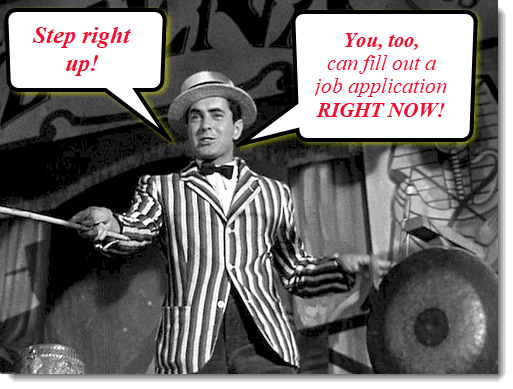Ask The Headhunter is usually about Q&A, but we’re going to do something different this week. We’re going to eliminate job interviews.
 I could write this column forever and not run out of material because you give me tons of great questions about job hunting and hiring, and each week I give you advice. But I have no delusion that it’s the best advice because the best advice surfaces in the discussions we have every week about whatever topic we’re covering.
I could write this column forever and not run out of material because you give me tons of great questions about job hunting and hiring, and each week I give you advice. But I have no delusion that it’s the best advice because the best advice surfaces in the discussions we have every week about whatever topic we’re covering.
You test everything I tell you, and that’s why I love doing Ask The Headhunter. But I’m going to suggest that you boldly start testing employers and the entire employment system that governs job hunting and hiring.
Question the employment system
What we do here every week is no-holds-barred evaluation and critique of whatever column we’re discussing. I like to think that’s what you come here for — for the candid, honest, respectful dialogue. I don’t think any other online public forum dares to do this.
So it occurred to me, why can’t you test the assumptions and methods employers use to match people to jobs?
- Why can’t you question the entire recruiting, interviewing and hiring process they subject you to?
- Why do employers dictate how this is done?
- Why are there no serious debates about the underpinnings of the employment system that employers and job seekers alike complain doesn’t deliver enough good matches — sometimes no matches at all?
That’s the Question of this edition: What should be done to dramatically change the employment system?
I want to hear about, and discuss, your ideas — because the employment system needs a major overhaul.
What if the employment system were illegal?
To motivate your thinking, I’ll propose a scenario: Resumes, job postings and job interviews are now illegal. They’re off limits.
The iconic emblems of our employment system have been vaporized by fiat. (Just like HR departments vaporize your job applications.) Employers and job seekers cannot use the machine any more — the machine that builds and sells shopping lists of your credentials and skills, that catalogs the “requirements” of jobs (as if jobs remain static once they are filled!), and that regulates the Top 10 Stupid Interview Questions that managers rely on to predict whether you can do a job.
In a world where vacant jobs supposedly outnumber unemployed people, where job seekers ghost the employers that used to ghost them (Rude Employers: Slam-Bam-Thank-You-Ma’m), and where none of 10,000 applicants have the necessary education, skills and experience to do an advertised job — we must figure out all over again, How should employers find and hire people?
Has Nick cracked up?
If this sounds like a fool’s errand, a waste of time, or a silly exercise that will change nothing, consider this example.
Several years ago I delivered the keynote at a conference of the National Resume Writers Association. (Yep — they hired a guy who says not to use resumes to give a speech to people who make their money writing resumes.) In the middle of my talk, I gave over 200 professional resume writers this exercise:
“Break yourselves up into groups of five. You have ten minutes to figure this out. What if resumes were illegal starting today? What would you sell to your clients instead?”
A few in the audience were visibly upset that they were paying to hear a guy tell them resumes were bad. They thought their association president must have cracked up — or that I was cracked for suggesting they stop selling resumes!
The rest of the audience lit up and went to work. They came up with some great ideas.
My favorite: One team suggested a new business model for themselves. They’d organize coffee hours or cocktail parties for groups of their job-seeking clients with hiring managers “to get them out of their business environment and bring them together in a social environment to loosen up a little and talk about their work.”
This group figured people might pay for a service like that. Done right, I think people would.
If a hall full of resume writers can smash their business model, surely we can upend the employment system and come up with good ideas to replace it.
Would you like to audition?
I’ll give you another example of startling ingenuity applied to fixing the employment system. In a comment he posted to a recent column (Weird Tales of Job Offers: The new hire who disappeared), reader Tim Cunningham suggested nobody should take a job without a no-fault audition.
“An employer and employee should have a short opportunity to judge the fit of the new situation for both parties with minimal risk. Just make a one-week mutual audition a part of the job offer.”
That is, an employer shouldn’t hire anyone, and no one should quit (or give notice at) their old job to take a new one, until both have had a try-out. Imagine how profoundly that would change things.
Job interviews are illegal
This is your chance to burn down the house and design a new one. And don’t feel guilty about it. None other than Laszlo Bock, the head of Human Resources at Google, told the New York Times that his company ran a big data analysis:
“We looked at tens of thousands of interviews, and everyone who had done the interviews and what they scored the candidate, and how that person ultimately performed in their job. We found zero relationship. It’s a complete random mess…”
Job interviews really should be illegal because Bock says they’re worthless as predictors of job success. Google announced this in 2013, and HR is still paying LinkedIn, ZipRecruiter and Indeed to schedule — what do we call them? — job interviews?
So please have at it, folks. Job interviews (and resumes and job postings) are illegal. So, what now?
- What’s the smartest thing to do to get paid for doing work?
- What should a manager do to get work done?
- Do people and work have to be “found?”
- How should we decide whether it’s a good idea to work together — and that it’s going to pay off?
- What’s the best way to assess a person’s fit to a job? Does that even really matter?
- If, as Tim Cunningham suggests, we should do auditions, how would that work?
- If, as the resume writers suggested, there’s a better way for employers and the talent to dispense with the formalities and get to know one another — what is it?
What should be done to dramatically change the employment system? All comers are welcome: Big ideas, little ideas, seemingly crazy ideas, and especially ideas that work better than the system that doesn’t.
: :


 A friend at a company I’m interested in working for referred me for a job. I have a phone interview scheduled with a “technical recruiter” later today. I asked if there was any special preparation I could do for the interview. I was told no, that we would be covering my previous experience and projects during the call.
A friend at a company I’m interested in working for referred me for a job. I have a phone interview scheduled with a “technical recruiter” later today. I asked if there was any special preparation I could do for the interview. I was told no, that we would be covering my previous experience and projects during the call. I’ve been in Human Resources 12 years and I have to say your article
I’ve been in Human Resources 12 years and I have to say your article  My suggestion to most businesses is that they can relieve their HR departments of recruiting, candidate selection and hiring functions without any significant loss. The HR function is Human Resources, not Human Recruiting. (See
My suggestion to most businesses is that they can relieve their HR departments of recruiting, candidate selection and hiring functions without any significant loss. The HR function is Human Resources, not Human Recruiting. (See 

 I’ve read many of your posts about job boards, including
I’ve read many of your posts about job boards, including  It’s a great fit. I
It’s a great fit. I  Earlier this week a recruiter contacted me. The salary was stated as a maximum only, and it would mean a 20% raise from my current salary. Even though I am not looking, I went ahead and applied.
Earlier this week a recruiter contacted me. The salary was stated as a maximum only, and it would mean a 20% raise from my current salary. Even though I am not looking, I went ahead and applied. 

 I dunno — maybe we should start Job Seekers Anonymous? It’s time we worked up a way to address employers who claim to want “exceptional talent” but expect you to turn off your talent and apply-for-jobs-by-numbers.
I dunno — maybe we should start Job Seekers Anonymous? It’s time we worked up a way to address employers who claim to want “exceptional talent” but expect you to turn off your talent and apply-for-jobs-by-numbers. “Hi, I’m Bill, a seasoned pro in [your field]. I’m interested in working for your company because it’s a shining light in our industry. But I’m puzzled by something. As a very busy [programmer, marketer, whatever] I don’t have time to waste with impersonal cattle-calls and online job forms, so I’m surprised your company is advertising rather than recruiting only the right people thoughtfully. I select potential employers very carefully. I’m ready to meet with your [marketing manager] to show how I can do the job to bring more profit to your bottom line.
“Hi, I’m Bill, a seasoned pro in [your field]. I’m interested in working for your company because it’s a shining light in our industry. But I’m puzzled by something. As a very busy [programmer, marketer, whatever] I don’t have time to waste with impersonal cattle-calls and online job forms, so I’m surprised your company is advertising rather than recruiting only the right people thoughtfully. I select potential employers very carefully. I’m ready to meet with your [marketing manager] to show how I can do the job to bring more profit to your bottom line.
 I do not work in the tech field where I know these are common. I’ve worked in marketing for 15 years, won awards, and worked for some top-name businesses. But recently I have encountered many recruiters that want you to prove your worth.
I do not work in the tech field where I know these are common. I’ve worked in marketing for 15 years, won awards, and worked for some top-name businesses. But recently I have encountered many recruiters that want you to prove your worth.